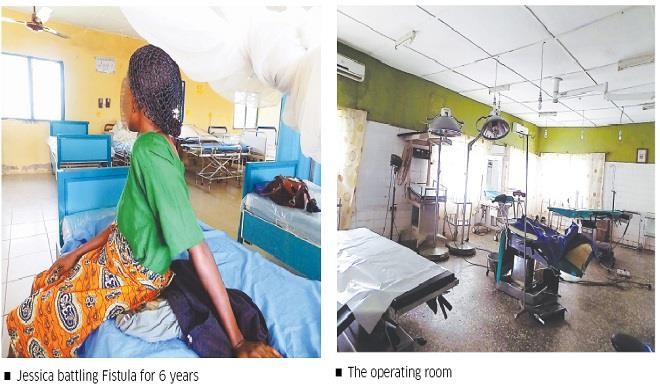Fistula: The holes afflicting women is treatable
Nearly 800 women die daily around the world from pregnancy or childbirth-related complications, global data suggests. One in 20 of them face some form of injury: among them obstetric vesico vaginal fistula (VVF). It is an abnormal hole between the vagina and the rectum or bladder caused by prolonged and or obstructed labour. Jessica (not […]


Nearly 800 women die daily around the world from pregnancy or childbirth-related complications, global data suggests.
One in 20 of them face some form of injury: among them obstetric vesico vaginal fistula (VVF). It is an abnormal hole between the vagina and the rectum or bladder caused by prolonged and or obstructed labour.
Jessica (not her real name), a caterer and event planner, lived with fistula for six years, until she ended up at a fistula repair centre at the General Hospital in Ogoja.
She told this reporter that she had never gone through obstructed labour and that she was never even pregnant.
She said a diagnosis by a doctor had revealed that there was a fibroid on her uterus. After the diagnosis, a family friend had directed her to a centre in Lagos where the fibroid could be removed through vaginal drug insertion
She lamented that it was a costly mistake; and that she paid N60, 000 for the suppositories she was told would dissolve the fibroid.
“Few days after the insertion I discovered I had a leakage. The woman in-charge of the treatment told me that it was because of the size of the fibroid and that the drugs had brought it down to the bladder. But unfortunately there was no improvement, it kept getting worse and the pain increased,” Jessica recalled.
As the pains got worse, she narrated that she was taken to a private hospital in Imo and charged N200, 000 for a procedure that was not successful. “I started moving about with diapers,” she said.
She went to the Lagos State University Hospital (LUTH) which charged her another N150, 000 for yet another procedure. Five weeks later, she still wasn’t dry.
“I was given two options: to close my bladder and divert the urine to my anus or move about with a catheter.
“I was told that I could be exposed to cancer of the rectum if I chose the first option. This sounded worse than my case already,” Jessica said.
Jessica is among 24 beneficiaries of a Pooled Repair for women living with fistula early this May in Ogoja. The Pooled Repair is organised by the Fistula Care Plus (FCP) a project run by Engender Health Nigeria (EHN) and funded by the US Agency for International Development (USAID).
“Thirteen of them came in for fistula repair, one of them with pelvic organ prolapsed. The 12 fistula cases have been successfully repaired but we are keeping them here for about two more weeks before we discharge them.
“We have a facility support group that has a mobile number which we give to treated patients who then serve as ambassadors of the centre. We have what we call a Fistula Forest. We can’t get to all of them; these post-repair patients show and tell them, ‘We are dry’, and that is how they contact us,” said Paul Ngaju, coordinator of the centre.
Alice Ude, assistant director and matron in charge of the fistula ward at the Ogoja General Hospital said patients were admitted to the hospital a week before their scheduled date to start preparing.
“Once the fistula is repaired, the women stay up to two weeks before they are discharged. They are required to return for follow up so that we check and advise them and continue counselling,” Ude said.
Ude stressed the need for pregnant women to register and attend ante-natal clinics at hospitals or public health centres. She pointed out the need for extensive training for traditional birth attendants to enable them manage pregnant women during labour, and especially detect when a woman is at risk and arrest the situation early.
“Pooling enables us to bring in additional skilled hands into a facility and to repair as many women as possible,” said Iyeme Efem, country manager for Engender Health Nigeria.
The pool repairs between 1,500 and 2,000 women every year.
But it also has to consider the backlog of women waiting for repair in a facility as well as available space and availability of skilled surgeons.
“Lack of resident surgeons at most facilities, feeding and maintaining the patients, who are expected to stay for several weeks, purchasing of consumables, among others, make managing the process tedious; but thankfully, USAID has stepped in to bridge that gap and provide the necessary support, but we need to have government come in and render some support to its people,” Efem explained.
At least a dozen dedicated fistula centres have been opened across the country, many of them with budget lines for fistula repair, prevention and rehabilitation.
Among these centres are Gesse Centre in Kebbi; Maryam Abacha Hospital in Sokoto; Farida Centre in Zamfara; Babbar Ruga Centre in Katsina; Laure Centre in Kano; Jahun Centre in Jigawa; National Obstetric Fistula Centres in Bauchi and Abakaliki; Ogoja General Hospital; Adeoyo General Hospital, alongside University College Hospital all in Ibadan and Sobi Specialist Hospital in Ilorin.
“To access the services, the care is free. All you need to do is go to or contact any fistula centre,” Efem pointed out.
